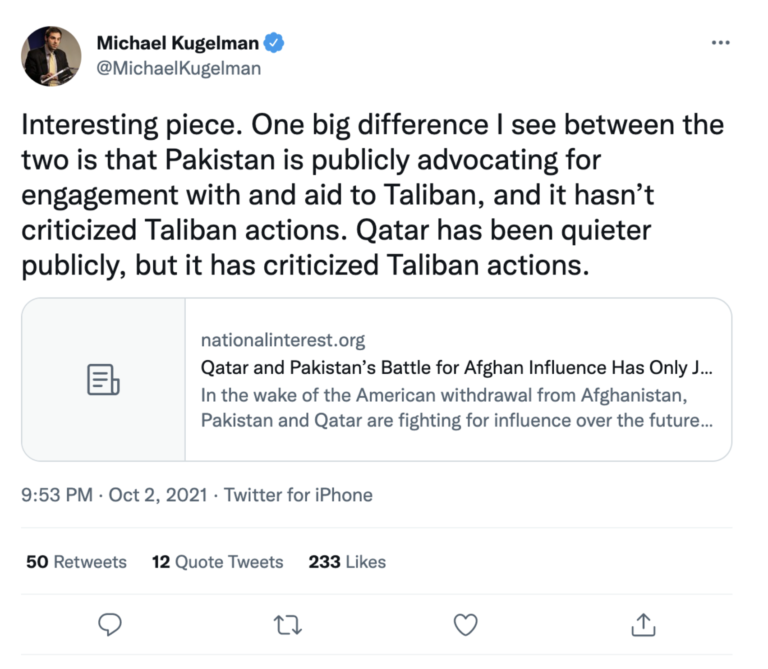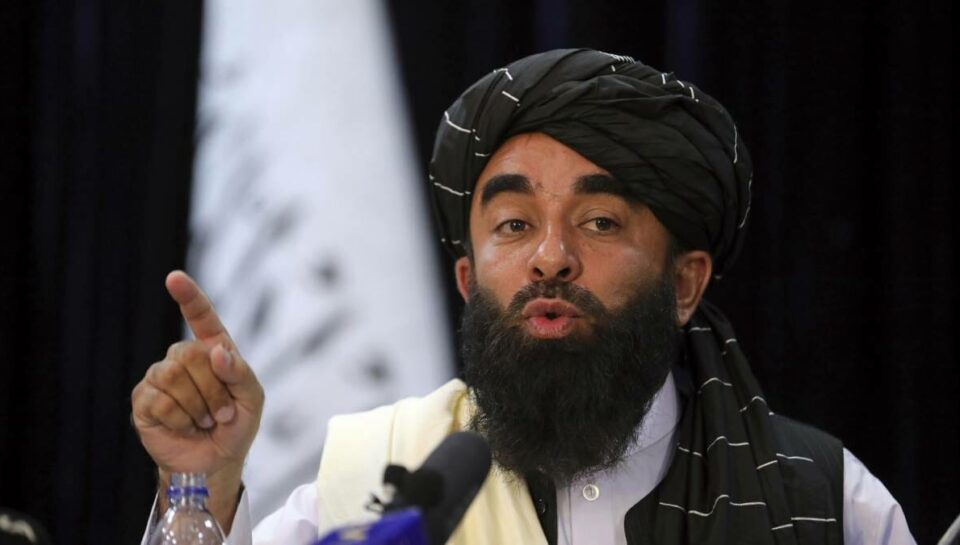Executive Summary
Deputy Director of the Wilson Center’s Asia Program, Michael Kugelman, tweeted over the weekend that “…Pakistan is publicly advocating for engagement with and aid to Taliban, and it hasn’t criticized Taliban actions”. The first part of this well-known expert’s statement is true while the second is misleading.

Pakistan’s stance towards the Taliban is pragmatic due to the simple fact that it’s the de facto leaders of a neighboring state from where multiple security threats emanate.
Nevertheless, Pakistan has indeed constructively critiqued the Taliban in ways that are intended to convey its concerns while avoiding any inadvertent offense.
Several high-profile examples prove this point. Prime Minister Imran Khan worked closely with popular American conservative broadcaster Glenn Beck to save the Afghan girls’ football team. This implies that he was concerned about their future in the neighboring country under Taliban rule. Prime Minister Khan later told the BBC that the Taliban’s speculated Afghan girls school ban would be un-Islamic, which was a message to them not to restrict women’s fundamental right to an education. The Pakistani leader also teamed up with the Tajik President to encourage the Taliban to form an ethno-politically inclusive government like they promised.
These facts contradict this misleading claim that Pakistan “hasn’t criticized Taliban actions”. The country certainly isn’t going to do so as obnoxiously as those in the West who don’t have any direct stakes in Afghanistan’s stability but are driven to talk about its internal affairs for the sake of virtue signaling their view of democracy and human rights, but it also hasn’t stayed silent either. Prime Minister Khan isn’t “Taliban Khan” like some of his Western detractors previously claimed and Kugelman’s tweet seems to imply for those who know how to identify such dog whistles. He’s a pragmatic leader who understands how to deal with the group.
It would be counterproductive to Pakistan’s national interests to once again carry out America’s bidding in Afghanistan. Prime Minister Khan has said on multiple occasions that those days are over. It’s therefore unrealistic for experts like Kugelman to expect Pakistan to “do more” as the infamous mantra goes by emulating the Western form of criticism against them. Doing so would rightly be regarded as meddling by the Taliban and would worsen relations between the two sides to the detriment of Pakistan’s security. By constructively critiquing the Taliban, Pakistan retains their trust and can utilize their services to facilitate TPP talks.
Whether it’s Kugelman’s intent or not, there’s no denying that some in the American Establishment (which in this context includes policy influencers like him just as much as the policymakers that rely on his work) would prefer to divide and rule Afghanistan and Pakistan by provoking tensions between them. There’s no quicker way to advance that Machiavellian end than to imply that Pakistan is doing the Taliban’s bidding by not criticizing them in the same way as the West is. If Pakistan didn’t have the confident policymakers that it presently does, it might capitulate to such public pressure from influential experts for the sake of approval just like in the past.
It’s important to point out how misleading Kugelman’s claim was because of the influence
that he has on shaping perceptions about Pakistani policy inside that country as well as his own. While it’s unlikely that those in the US who are influenced by his work will ever come across this rebuttal, there’s a chance that a lot of Pakistanis might read it because of the platform that published it. They should realize that Kugelman’s claim is misleading and might have even been deliberately so. From an outsider’s perspective, he seems to represent the faction of policy influencers that are skeptical of Pakistan and seeks to appeal to like-minded policymakers.
If this assessment is accurate, then it means that well-intended Pakistanis are wasting their time by engaging with him on social media. They aren’t going to change his mind, but by interacting with him after being provoked by tweets such as that one and others, they’re only boosting his organic reach. This term refers to the algorithm’s prioritization of certain posts in others’ feeds without that user paying to promote them. The exact workings remain unknown, but many believe that posts that generate a lot of reactions meet this criterion. This means that those who hope to change his mind after being baited are actually boosting his misleading posts.
This in turn helps them go viral, which could then contribute to further shaping the perceptions of those who might come across his posts on that platform due to the organic reach that his critics inadvertently gave him. Kugelman, like everyone, has the right to his opinion, but those who disagree with his generally skeptical take on everything regarding Pakistan would do better to ignore his posts instead of engage with them if they want to limit the damage to their country’s perception. Those like-minded policymakers who rely on his work to influence their own won’t be affected by this, but it could at least mitigate its effect on the general public.
Back to the primary topic of this analysis, nobody should have any doubts that Pakistan does indeed disagree with the Taliban on some issues but it responsibly expresses this through constructive critiques. This stands in contrast to the arrogant way in which some in the West convey similar concerns. Experts like Kugelman might hope to influence Pakistani policymakers into emulating his country’s style by misleadingly implying that they’re Taliban stooges for not doing so, but the country has become much more confident over the years and thus isn’t likely to compromise on its national interests in Afghanistan just for the sake of approval from foreigners.



